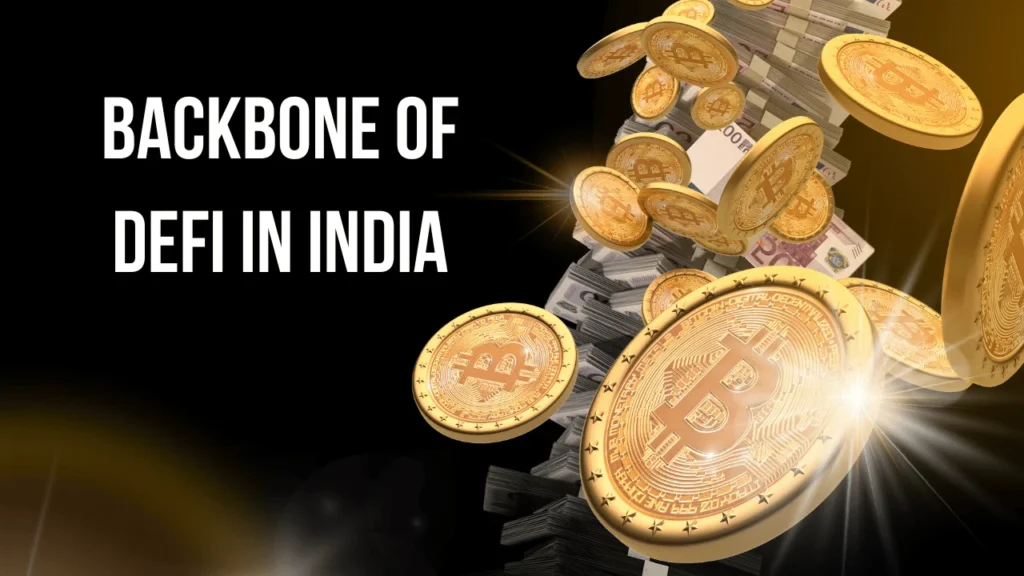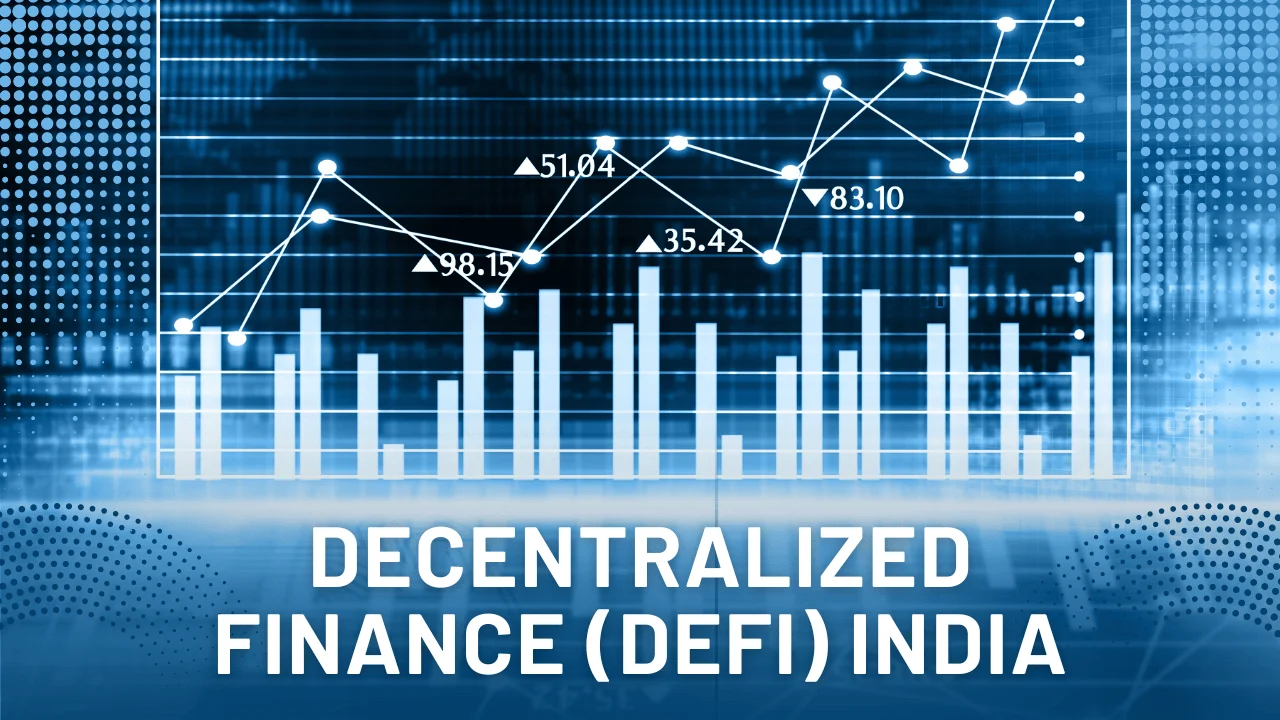Particularly in nations like India, where the convergence of technology and finance has the ability to reshape the conventional banking system, Decentralized Finance (DeFi) has become a guiding light of inclusivity and innovation in the ever-changing world of global finance. Decentralized Finance (DeFi) India has emerged as a beacon of hope, offering solutions that bypass traditional financial intermediaries and provide direct access to financial services for millions of unbanked or underbanked individuals. With a population of over 1.3 billion people, the adoption of DeFi in India could mark the onset of a revolutionary transformation within its financial sector, setting a precedent for other countries to follow suit. Despite facing legal and regulatory hurdles, the rapid growth of DeFi in India showcases a resilient determination towards achieving financial inclusion and empowerment for all.
Backbone of DeFi in India

Blockchain Technology Growth India
The fast development and acceptance of blockchain technology is central to the expanding presence of DeFi in India. Blockchain, with its well-known transparency and strong security features, is the backbone of DeFi applications, allowing for decentralised transactions to take place without a governing body. Blockchain technology has found an ideal home in India, thanks to the country’s robust information technology industry and tech-savvy populace. The development and application of blockchain technologies across various industries, not only finance, have been further expedited by the government’s push towards digitalization and the increasing interest from the private sector.
Cryptocurrency Adoption India
As a store of value and a means of transaction, cryptocurrency is integral to the DeFi ecosystem. A new lease of life was given to India’s cryptocurrency market when the Supreme Court decided to reverse the RBI’s prohibition on cryptocurrency dealings. High returns and easy access to global DeFi platforms have led to a noticeable uptick in cryptocurrency adoption among Indian users since then. This increasing excitement is a reflection of how DeFi has the ability to transform the country’s financial transactions and investments.
DeFi Market Opportunities India
Thanks to the government’s encouragement of technological innovation and the country’s enormous unrealized potential, the Indian DeFi market is flourishing. The objective of financial inclusion in India is in line with DeFi’s novel proposal to provide banking services to the unbanked and underbanked population. Furthermore, with a robust pool of tech talent and a flourishing startup ecosystem, India offers a great opportunity for DeFi innovations and solutions that are specific to the country’s problems and needs.
Financial Inclusion via DeFi India
The potential of DeFi to increase access to financial services is a powerful argument in favour of the technology in India. Since many people still can’t use traditional banks, DeFi platforms provide an alternate way for them to gain control of their own financial futures. Taking advantage of the vast internet and mobile penetration in India, DeFi can alleviate financial inequality by making savings, investment, and credit products easier to access.
DeFi Startups and Innovations India
Many new companies and developments in India’s financial technology sector have emerged as a result of the increased focus on DeFi. In addition to creating DeFi solutions for the Indian market, these businesses are making strides in the DeFi ecosystem worldwide. There is hope for the future of decentralised financial infrastructure (DeFi) in India thanks to the pioneering work of Indian startups in areas such as product development and blockchain network security and efficiency.
Challenges and Considerations

DeFi Regulatory Landscape India
The ever-changing regulatory environment is a significant obstacle to the promising expansion of DeFi in India. Important obstacles include the RBI’s long-standing mistrust of cryptocurrencies and the lack of defined rules for DeFi platforms. Nevertheless, the crypto community and regulators are actively engaging in dialogue, and the Supreme Court’s decisions that have shown support imply that a more favourable regulatory framework is being slowly but surely advanced. Building confidence and stability in the DeFi market through the establishment of transparent rules and regulations is essential for promoting additional adoption and innovation.
DeFi Security Concerns India
Due to the digital and decentralised character of the transactions, security is of the utmost importance in the DeFi domain. The necessity for improved security measures and best practices has been highlighted by instances of fraud and hacking. Using cutting-edge encryption technology and educating users on best practices are two ways in which security can be prioritised by Indian DeFi platforms and their users. To keep users’ trust and encourage sustainable growth, it is critical to create a DeFi ecosystem that is secure.
Tech Talent in Blockchain India
There is a strong correlation between the availability and growth of blockchain technology talent in India and the expansion of DeFi. Having a strong educational system and an emphasis on STEM subjects has helped India produce a large pool of talented individuals. But DeFi can’t be fully realised without continuous funding for blockchain training and education. To maintain the growth momentum of DeFi in India, it is crucial to promote innovation and offer resources to aspiring blockchain developers.
Cross-Border Remittances DeFi India
Particularly for a nation like India, which ranks among the top recipients of remittances globally, the field of decentralised finance (DeFi) offers revolutionary possibilities for international money transfers. Faster, cheaper, and available to more people, these transactions can be streamlined with DeFi.
Reducing Transaction Costs
There are a lot of fees and exchange rates associated with traditional international money transfers. A more cost-effective alternative is DeFi platforms, which do away with middlemen in the financial system. Millions of Indians living abroad will be able to send more of their hard-earned money to their loved ones back home thanks to this drop in transaction fees.
Speeding Up Transactions
When compared to traditional banking systems, the transaction speed of DeFi remittances is unmatched. Unlike conventional remittance routes, which involve a number of middlemen, blockchain technology allows for instantaneous transaction processing. Beneficiaries who depend on these funds for immediate needs greatly appreciate this ability for instant processing.
Enhancing Accessibility
DeFi platforms remove obstacles for users in underserved or far-flung locations by making them available to anyone with an internet connection. This is especially helpful for India, since many people there might not have easy access to regular banks. With DeFi, more people will be able to afford financial services, and users will have greater agency over their own money.
Smart Contracts Adoption India
A “smart contract” is an agreement whose terms are encoded in code and can be executed automatically. They have the potential to further improve the security, transparency, and efficiency of financial transactions in India’s DeFi ecosystem if adopted.
Automating Financial Agreements
There is less room for fraud and middlemen when using smart contracts to automate and enforce monetary agreements. When it comes to complicated financial transactions like loans and insurance, this automation can really help streamline processes and make them more user-friendly.
Transparency and Security
With smart contracts and blockchain’s immutability, everyone involved in the transaction can be certain that the record is clear and unchangeable. With India’s recent push towards digital finance, this degree of security and openness is attractive and will go a long way in establishing confidence in DeFi platforms.
Facilitating Innovative Financial Products
Thanks to smart contracts’ programmability and adaptability, new financial products can be developed to meet unique requirements in different settings. This has the potential to advance financial inclusion in India by inspiring the creation of DeFi solutions tailored to the specific needs of various demographics.
Fintech Revolution DeFi India
Financial services in India are about to undergo a paradigm shift with the introduction of DeFi to the country’s fintech ecosystem. This transition is in line with the country’s quickly changing digital landscape, which is both technological and cultural.
Empowering Startups and Entrepreneurs
DeFi removes barriers to innovation in India’s fintech startup and entrepreneur ecosystems by facilitating transactions outside of the purview of conventional banking institutions. Because of this, the fintech ecosystem has grown, and there has been an upsurge in entrepreneurial endeavours that use DeFi to solve financial problems.
Enhancing Financial Services Delivery
From payments and remittances to lending and borrowing, DeFi technologies allow for more efficient and flexible delivery of financial services. For nations like India, where the rise of fintech has the potential to bypass the barriers imposed by conventional banking systems and reach previously unbanked and underserved communities, this level of efficiency is of the utmost importance.
Financial Literacy and Inclusion
By getting more people to use digital financial services, the growth of DeFi in India might boost financial literacy. With its user-friendly and straightforward financial tools, DeFi has the potential to make a big splash in the fight for financial inclusion, helping more Indians join the formal banking system.
Future of DeFi in India
With India on the verge of a financial revolution, the future of DeFi holds both possibilities and threats. To fully realise DeFi’s potential, technology, innovation, and regulatory backing must come together. By bringing about inclusivity, efficiency, and empowerment, DeFi has the ability to revolutionise the Indian financial landscape, making it more accessible, transparent, and resilient. Embracing new technology is only part of DeFi’s journey in India; it’s also about reimagining the future of finance for millions. We are entering a new age of financial democracy and innovation as the ecosystem ages and gets over its growing pains, and the goal of a decentralised financial world seems more and more attainable.
FAQs
Q: What is DeFi?
Financial services offered on blockchain technology that do not rely on centralised institutions like banks are known as DeFi, or Decentralised Finance.
Q: How does DeFi benefit remittances to India?
With DeFi, sending money to India from abroad is easier, faster, and cheaper.
Q: Are DeFi transactions secure?
Absolutely! Blockchain technology ensures that all DeFi transactions are secure, transparent, and impossible to tamper with.
Q: Can DeFi improve financial inclusion in India?
Definitely. Financial inclusion in India stands to benefit greatly from DeFi’s easily accessible financial services.
Q: How are smart contracts relevant to DeFi in India?
To improve the efficiency, transparency, and security of transactions, smart contracts automate and enforce financial agreements on DeFi platforms.
Also Read: Indian Blockchain Startups: A Detailed Guide
Conclusion
The advent of Decentralized Finance (DeFi) India has brought about a sea change in the country’s financial system, providing game-changing answers to age-old problems like efficiency, accessibility, and financial inclusion. With the help of blockchain technology, DeFi could make India’s financial system more accessible, safe, and efficient for everyone. With DeFi’s revolutionary effects on remittances, smart contracts, and the fintech revolution, all Indians will have easier access to financial services in the future. To fully utilize DeFi in India, it is essential that innovators, regulators, and the community work together as the ecosystem develops.

Timothy Jensen is an expert writer who specializes in the world of cryptocurrencies, including blockchain technology and Bitcoin. He has a passion for explaining complex topics in an easy-to-understand way. Timothy’s work aims to demystify the digital currency landscape for his readers.

